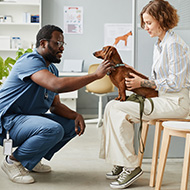RCVS Council approves 'Under Care' reforms

The approved guidance includes a safeguard that veterinary surgeons should perform a 24-hour follow-up service if they do not physically see the animal before prescribing.
RCVS Council has voted to approve reforms to the definition of ‘under care’ for veterinary professionals.
During a meeting held at the University of Nottingham's Veterinary School on Thursday (19 January), members approved the new guidance with a majority vote of 20-to-3.
Under the new guidance, veterinary surgeons will no longer be required to conduct a physical examination of the animal before prescribing POM-V medications. Instead, they will be able to use their professional judgement to consider what is appropriate in a specific situation.
The approved guidance includes a safeguard that veterinary surgeons should perform a 24-hour follow-up service involving examination if they do not physically see the animal before prescribing.
'Where a veterinary surgeon is not able to provide this service themselves, they should arrange for another veterinary service provider to do so' the guidance states. 'This arrangement should be made before veterinary services are offered and confirmed in writing as part of the conditions of service agreed by the client'.
BVA response
Responding to the move, BVA president Malcolm Morley expressed concern over the decision and its implications to how vets work.
"The changes to ‘under care’ guidance are a watershed moment, so it’s positive to see that they have evolved in response to feedback from the profession. New technology presents exciting opportunities to enhance existing veterinary services and has benefits for practices as well as clients and their animals," he said.
"However, BVA has been very clear that we believe remote prescribing can only be safely delivered where a vet-client-patient relationship has been established. This is an internationally recognised concept, and we are disappointed that the RCVS has decided not to embrace it."
Mr Morley continued: “Having voted to implement these changes, it is incumbent upon the RCVS and the profession to scrutinise how they play out. At BVA, we plan to develop advice and resources to support our members and help them comply with the new guidance and realise any benefits of remote veterinary service provision.
“It is now vital that a timeframe for a review is quickly put in place, so any negative impacts on animal welfare or the sustainability of veterinary services can be dealt with swiftly."
RCVS Council agreed that the changes will be implemented between 1 June and 31 December 2023, subject to a final review at the next RCVS Council meeting.
Additionally, members requested that the interim period be used to prepare more case studies and advice to help veterinary professionals understand how to apply the new guidance to their particular sectors.



 The Animal and Plant Health Agency (APHA) has updated its online reporting service for dead wild birds.
The Animal and Plant Health Agency (APHA) has updated its online reporting service for dead wild birds.